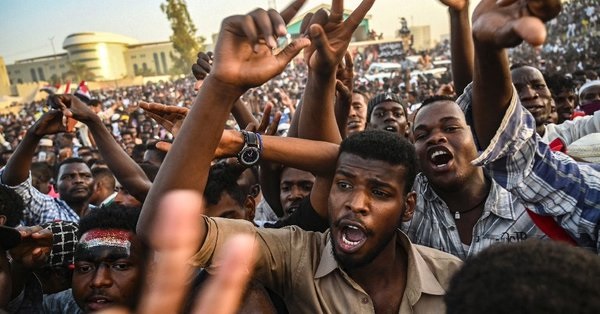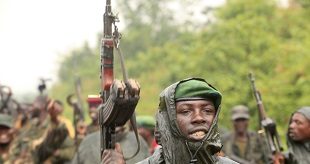
Khartoum, Sudan | AFP | Sudanese protest leaders on Wednesday turned down an offer by the ruling military council for talks and demanded justice for a crackdown that doctors said has left 101 people dead.
Security forces moved in to brutally disperse a protest sit-in on Monday.
The Rapid Support Forces, paramilitaries said by rights groups to have their origins in the Janjaweed militias accused of abuses during the 16-year-old conflict in Darfur, are thought to have been largely behind the crackdown.
The Central Committee for Sudanese Doctors close to the protest movement said on Wednesday that at least 101 people had been killed in the crackdown, including 40 bodies that were recovered from the Nile river.
Sudan has been controlled by a military council since it ousted veteran president Omar al-Bashir in April after protesters demanded an end to his authoritarian rule before agreeing a three-year transition period to a civilian administration.
But army ruler General Abdel Fattah al-Burhan said following the crackdown that the agreement had been ditched and an election would take place within nine months — a plan rejected by demonstrators.
On Wednesday, however, Burhan said those in “the military council open our arms to negotiate with no restriction”, an offer that the protest leaders were quick to reject.
“The Sudanese people are not open for talks,” said Amjad Farid, a spokesman for the Sudanese Professionals Association (SPA) which spearheaded protests that led to the ouster of Bashir.
“The Sudanese people are not open to this TMC (Transitional Military Council) that kills people and we need justice and accountability before talks about any political process,” he told AFP.
Farid said both the SPA and umbrella protest group the Alliance for Freedom and Change would “continue using all non-violent tools and civil disobedience in resisting the TMC”.
The rejection came after the commander for the Sudanese paramilitary forces accused of carrying out the deadly crackdown insisted the country would not be allowed to slip into “chaos”.
“We will not allow chaos… we must impose the authority of the state through law,” Mohamed Hamdan Dagalo, deputy chief of the military council, told troops in a televised address.
– ‘Bloody massacre’ –
Dalgalo, known as Himediti, leads the Rapid Support Forces (RSF) that protesters say is responsible for the “bloody massacre”.
The general singled out makeshift barricades erected across streets by demonstrators that are aimed at blocking the security forces.
Hospitals in Khartoum said they were struggling to cope with the number of wounded after security forces on Monday raided a weeks-long sit-in outside army headquarters.
“The situation is very difficult. Most of the hospitals have taken in more casualties than they have capacity for,” a doctor who works at two hospitals in the city told AFP.
“There’s a shortage of medical staff, a shortage of blood, and it’s difficult to do surgery because some operations can only be done in certain hospitals,” said the doctor, who asked not to be named.
“Among the wounded there are still people in a serious condition and I expect the number of deaths to rise.”
– ‘Total civil disobedience’ –
There was a heavy security presence as worshippers in some neighbourhoods came out to mark the Eid al-Fitr festival.
In Omdurman, just across the Nile from Khartoum, security forces were seen patrolling in trucks mounted with what appeared to be anti-aircraft and machine guns and other weapons including rocket-propelled grenades.
Protest leaders have called on their supporters to take part in “total civil disobedience” to topple the military council.
On Wednesday, hundreds of residents of north Khartoum blocked off streets with rocks, and waited by them in silence, a witness told AFP.
In the distance gunfire was heard.
The United Nations said late Wednesday it was relocating some of its staff away from Khartoum, while Britain warned its citizens against all but essential travel to Khartoum and decided to pull non-essential staff from its embassy.
– Saudi call for dialogue –
The Sudanese Doctors Union accused security forces of attacks on hospitals and staff across the country, and alleged some women had been raped in an area of the capital without giving details of how the group had learned of the assaults.
A push for the UN Security Council to condemn the killing of civilians and call on the military and protesters to work together was blocked by China, which was backed by Russia, during a closed-door meeting on Tuesday.
Eight European countries instead issued their own joint statement criticising “the violent attacks in Sudan by Sudanese security services against civilians”.
The British ambassador to Khartoum, Irfan Siddiq, called for an end to the internet outages that have plagued the country since the crackdown.
“In these critical times it is essential that everyone can communicate, particularly to urge messages of keeping things calm and peaceful,” he tweeted.
Top US envoy David Hale, under secretary of state for political affairs, underlined the importance of a transition to a civilian-led government in a phone call with the Saudi deputy defence minister, Khalid bin Salman, the State Department said.
Saudi Arabia, a key backer of the military rulers, called for a resumption of “dialogue between the various parties of Sudan”.
 The Independent Uganda: You get the Truth we Pay the Price
The Independent Uganda: You get the Truth we Pay the Price


